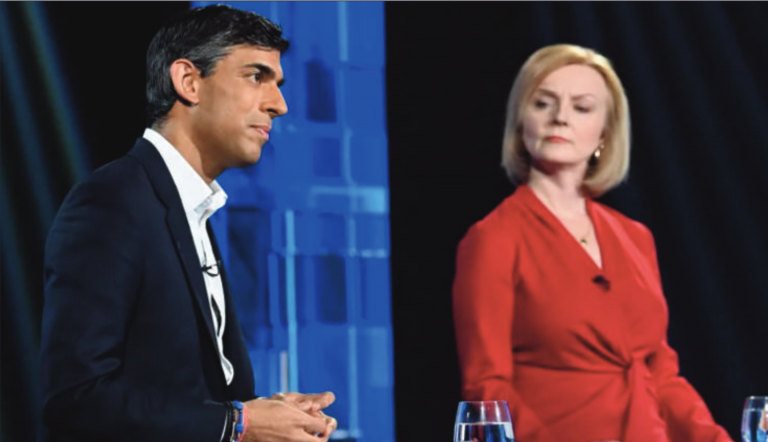As the Tory leadership contest degenerates even further into a race to the far right in an effort to win over the peculiar ‘selectorate’ of 160,000 mainly elderly, prosperous Party members, the NHS has been one of the last issues to be raised.
Both Rishi Sunak and Liz Truss offer the most simplistic and self-defeating solutions. Sunak wants a “task force” driving for tougher targets, to bully NHS staff harder and magically make waiting lists stop growing by next year.
Truss apparently sees the answer as cutting out layers of management, but angered Tory ministers (and the Tory Mayor of Tees Valley) by her ludicrous claim that in a cost of living crisis she can save £11 billion by cutting the pay of civil servants and public sector workers outside London, and has had to drop the policy less than 24 hours after announcing it.
The escalation of idiocy comes as both candidates apparently target the most ignorant and reactionary layers of their party in a battle of impractical ideas.
A Telegraph summary of their positions on the NHS says Sunak’s big idea is a gimmick that even Telegraph readers have ridiculed – a £10 fine for missed GP and hospital appointments as part of a “transformative” shake-up of the health system:
“He said that patients would be given “the benefit of the doubt” the first time they miss an appointment, but subsequent absences would incur charges. The system would be “temporary” as the NHS tries to clear the Covid-19 backlog of more than six million patients waiting for planned care.”
How such fines would be levied or collected, and how much this would cost in additional bureaucracy which would contribute nothing to health care is of course not discussed. Tellingly the sketchy section on the NHS follows bellicose Sunak’s right wing pledges on Brexit, Defence, Housing, Immigration and a promise to bring back grammar schools.
Sunak also apparently wants to increase NHS use of private hospitals and is apparently also considering “giving patients the right to have a nominated family doctor if they want one rather than being simply attached to a surgery,” although again there are obviously no details or explanation.
We learn from the Times that in a policy based more on King Canute than his idol Margaret Thatcher, he is hell-bent on demanding the impossible, a miraculous improvement for no extra cost:
“Sunak wants waiting lists to stop rising next year. Under current plans they will continue to increase until March 2024. He wants one-year waits eliminated by September 2024, six months earlier than existing plans.”
Truss by contrast appears from the Telegraph summary to have no policies or views on the NHS, but the Independent summary includes her agreement that there is an urgent need to deal with care backlogs, a promise to install a “strong” health secretary to solve the issue [!] and her assurance she is “completely committed” to current Government promises for NHS spending, despite her plans for tax cuts.
In a televised Sun debate, Truss even appeared to accept the government’s failure to invest enough in the NHS, pointing out the hospital closest to her constituency, Queen Elizabeth, Kings Lynn, is literally falling down: but neither she nor Sunak has proposed any additional funding to tackle such problems.
Truss’s real position, however, is more ambiguous still, since along with Dido Harding’s husband John Penrose she is one of an 8-strong Parliamentary Board of the 1828 Committee, whose ‘Neoliberal Manifesto’, published jointly with the Adam Smith Institute in 2019, condemns the NHS record as “deplorable” and states:
“We believe that the UK should emulate the social health insurance systems as exist in countries such as Switzerland, Belgium, the Netherlands, Germany and Israel, among others. Under these systems, individuals pay regular contributions — as they currently do for the NHS through taxation — to their chosen insurer. They are then free to seek treatment from a medical provider of their choice and their insurance company subsequently reimburses the provider for the expenses incurred.”
The small detail missed out in this manifesto for privatisation is that with the exception of Israel, all of the preferred systems spend considerably more per head than the UK. While Israel spends less, the most recent (2015) WHO assessment of its healthcare system suggests it is not much of a model for the NHS to aspire to:
“One of the greatest current challenges for Israeli health care is its growing reliance on private financing. As described in Chapters 3 and 6, the ongoing shift from public to private financing has troubling implications for both equity and efficiency. Why are more and more Israelis signing up for private health insurance? There does not appear to be a full answer, but motivating factors appear to include concerns that the mainstream, publicly financed system will not give them access to all necessary medical services, will require them to wait inordinately for covered services, will not be sufficiently patient centred and will entrust their operations to surgeons who are not sufficiently experienced or sufficiently talented.”
In other words an under-funded public system in Israel exhibits many of the same problems that are now being relentlessly pilloried by the right wing press here as they step up the propaganda for more “reforms” to the NHS.
Dear Reader,
If you like our content please support our campaigning journalism to protect health care for all.
Our goal is to inform people, hold our politicians to account and help to build change through evidence based ideas.
Everyone should have access to comprehensive healthcare, but our NHS needs support. You can help us to continue to counter bad policy, battle neglect of the NHS and correct dangerous mis-infomation.
Supporters of the NHS are crucial in sustaining our health service and with your help we will be able to engage more people in securing its future.
Please donate to help support our campaigning NHS research and journalism.


